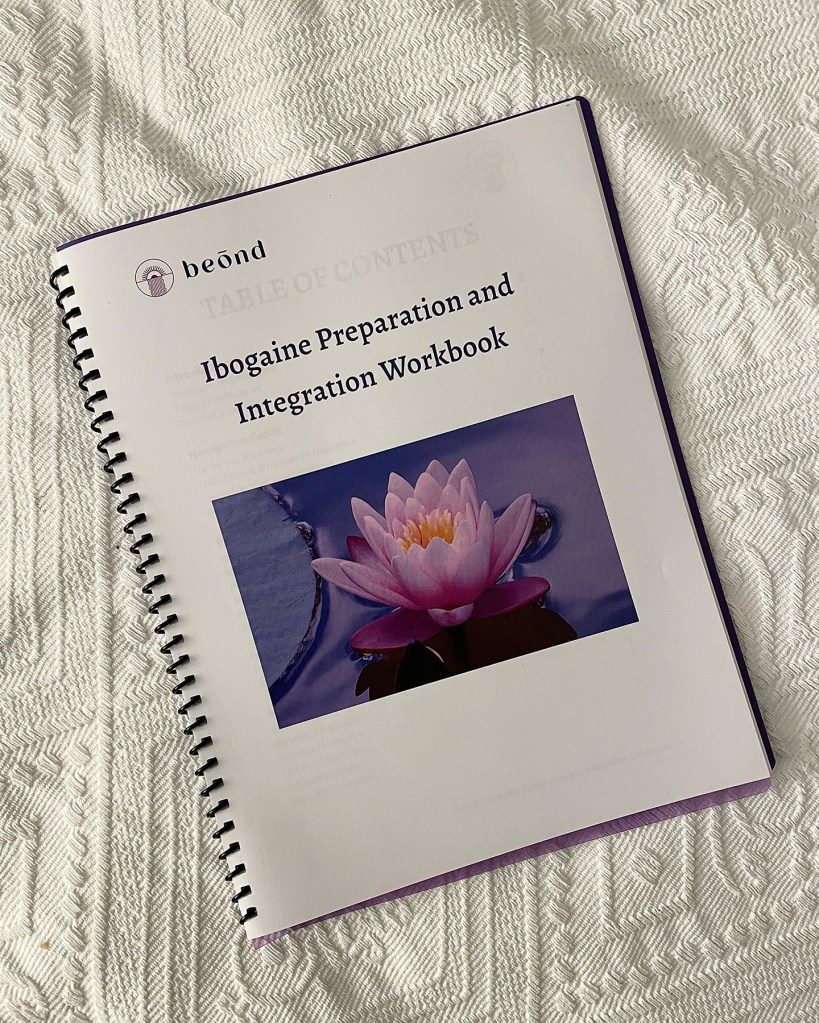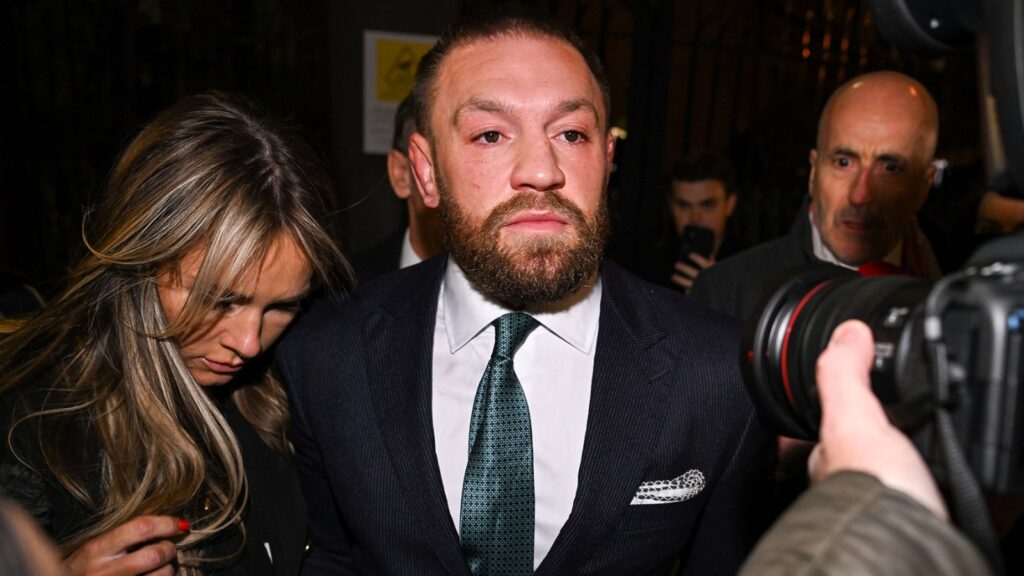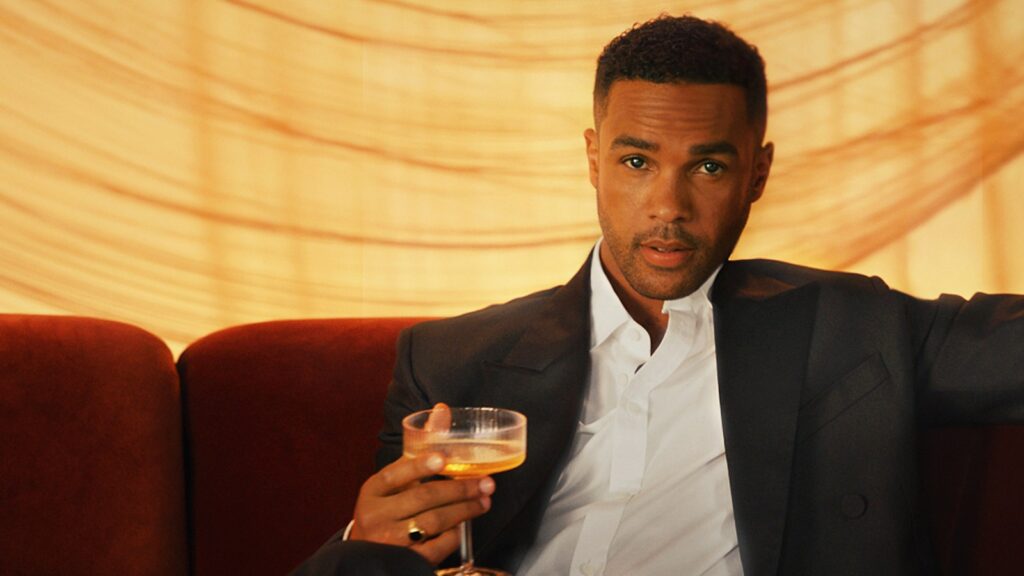He Took a Psychedelic to Cure His Addiction. It Was His Last Trip
In the spring of 2022, a 49-year-old New Yorker named David* headed south to Cancún, Mexico. He went to overcome his dependency on drugs using ibogaine, the primary alkaloid in a central African root bark named iboga. The lengthy visionary journey that typically ensues with this dream-inducing psychedelic is so intense that it is known as “the Mount Everest of psychedelics.” Some hardcore psychonauts take ibogaine for “psycho-spiritual” purposes, but most only subject themselves to it because they are in the depths of substance dependence and see ibogaine as their last hope. People like David.
*David’s name was changed for this story at his family’s request.
He had a huge incentive to get sober once and for all. David had recently inherited several million dollars from his father. Starting in 2018, David had lived in a sober community in South Carolina, working as a baker, after some 25 years battling addiction. But his father’s death in August 2021, and a subsequent romantic relationship, ultimately had a destabilizing effect. By February 2022, David relapsed after four years sober. He went swiftly back to his old ways, taking fentanyl and cocaine, while using the heroin-substitute drug Suboxone and copious amounts of Valium. He was nodding out almost daily, including with a needle in his arm. He was driving his own death train, and was going off the rails.
“Out of nowhere, he called me, and his mom, because he had relapsed and was in a really bad way,” says Sophie, his ex-wife, whose name was also changed to protect David’s privacy. David’s teeth had begun to fall out, and this proved to be the final straw. “He wanted help getting into an ibogaine clinic.”
David had always flirted with the idea of psychedelic therapy, and he knew a better life could await him if he stopped taking drugs. An increasing number of people have declared near miracles thanks to ibogaine; being an oneirogen, meaning a substance that produces waking dreams, it can conjure trauma-processing, autobiographical movies in the mind, while minimizing bone-chilling opiate withdrawal symptoms.
Coincidentally, Sophie, who also struggled with substance use, was already in conversations to visit a high-end clinic on the southeastern Mexican coast. (Ibogaine is illegal in the U.S., but unregulated in Mexico.) Beond, based out of a mansion in Cancun, had just opened to great fanfare with a glowing endorsement from Multidisciplinary Association for Psychedelic Studies (MAPS) founder Rick Doblin, and an online event with addiction expert and author Gabor Maté. Beond also hired Dr. Jeffrey Kamlet, an ibogaine expert and former president of the Florida Society of Addiction Medicine, as their chief medical officer. To speed things up, “I gave him my spot,” Sophie says. She planned to undergo her own treatment after David’s process was complete.
David and Sophie had often discussed the possibility of taking ibogaine and “breaking open the head,” as taking the psychedelic is known in Gabon, where iboga was first discovered centuries ago. They had been friends for 25 years, including seven as a married couple. David, who studied business at the University of Montana, was no stranger to psychedelics. He told friends his years following the Grateful Dead were the best of his life. Talk of the life-changing effects of ibogaine would crop up every so often in his community, too. Some go back to using drugs like heroin after visiting an ibogaine clinic, but they have a blissful window, however brief, to get well. For David, it would be the end of the line.
THOUGH IBOGA HAS BEEN USED for centuries by indigenous peoples in Gabon, ibogaine entered the pharmacopeia in 1901, after scientists isolated the alkaloid from its parent plant. From the 1930s, ibogaine was used as a component of Lambarène, a drug marketed in France as a stimulant and antidepressant. It became popular among athletes after World War II as a performance-enhancing drug — later banned, in 1989, by the International Olympics Committee — and in the 1960s a Chilean psychiatrist, Dr. Claudio Naranjo, discovered it has the potential to help patients retrieve repressed memories. In 1963, 19-year-old Howard Lotsof was experimenting widely with drugs while dependent on heroin. A chemist friend gave him ibogaine. “Suddenly, I realized that I was not in heroin withdrawal,” Lotsof later said. “Where previously I had viewed heroin as a drug which gave me comfort, I now viewed heroin as a drug which emulated death. The very next thought into my mind was, ‘I prefer life to death.’”
Lotsof set about on a quest to transform the world with ibogaine, despite being banned in the U.S. alongside other known psychedelics in 1967. In 1986, he gained a patent for ibogaine’s use to treat heroin and cocaine addiction, and subsequent National Institute on Drug Abuse (NIDA) research showed that it caused rodents to consume fewer drugs. The FDA then approved an early phase trial, but it was halted after NIDA opted not to fund it, citing a lack of faith in ibogaine and safety concerns after a young woman, Nicola, died during a heroin detoxification treatment with ibogaine in June 1993 at Lotsof’s makeshift clinic in the Netherlands. (The cause of death was inconclusive.)
Mattha Busby
Still, the small number of opiate-dependent patients in the nixed study showed no signs of withdrawal after taking the psychedelic. Ibogaine also had gained some sympathy within NIDA: Dr. Carlo Contoreggi of NIDA’s Division of Intramural Research said at the time that “even if ibogaine is slowed down, it’s too late to stop it. They know it works.”
As expected, observational trials have shown that ibogaine can reduce the need for opiates. One study in Mexico reported that a year after treatment, seven out of 30 patients reported no recent opioid use. In a smaller study, six out of 14 people tested negative for opioids after a year. (For comparison, one study which measured the relapse rate for opioid addicts six months after a short rehab stay put the figure at up to 77 percent.) In New Zealand, the drug can be legally prescribed for opioid dependence, after its medical regulator changed its status in 2009. “We are beginning to unravel a potential direct anti-addictive mechanism of action of ibogaine,” explains Dr. Rayyan Zafar, a neuropsychopharmacologist at Imperial College of London’s Centre for Psychedelic Research.
The need for effective, widely available treatments for addiction is more urgent than ever, adds Zafar, with the casualties from the opioid epidemic in the U.S. mounting, claiming roughly 100,000 drug deaths a year. Ibogaine “could show potential” in terms of easing the death toll, he says.
There is still no high-quality clinical trial data despite this early-stage research. But in January, a seminal 30-person Stanford study on U.S. war veterans showed ibogaine can safely diminish the effects of traumatic brain injury (TBI) — a condition that leads to PTSD, depression, and anxiety. “I continue to say I think this is the most sophisticated drug on the planet,” Dr. Nolan Williams, who led the study, recently said on The Tim Ferriss Show. “There’s nothing else that can seem to do this.” The near magical life-review that many report allows people to see themselves in their memories as if they were flies on the wall: “You’re able to hold this neutral place, and have this sense of where you were and why you did what you did, and you’re able to intuit, empathize,” Williams explains. “Being able to forgive or to forget or to understand this person’s position as well as your own, and then seemingly unlock the lock on both sides and kind of dissolve the problem.”
MAPS, the research nonprofit focused on psychedelic reform that has spearheaded groundbreaking research into MDMA, could soon turn its attention toward ibogaine. It hopes to raise more than $80 million dollars over four years to secure FDA approval. “We propose to do so in a truly open science manner,” Doblin said in a letter earlier this year, “without seeking patents, and with the intention of immediately making the drug generic.” Ibogaine has also attracted the interest of Google co-founder Sergey Brin, whose nonprofit is bankrolling a new biotech startup with $15 million to conduct further research into the effect of the drug on TBI.
The optimism around ibogaine led Colorado, in 2022, to vote to decriminalize the medicine and open the prospect of future authorization after 2026. Kentucky suggested it would invest $42 million into ibogaine research, but the plans were dropped in January by the incoming state attorney general, who replaced the commission chair, the driving force behind the proposal, with a former agent of the DEA.
Part of the consternation over ibogaine is that, in a very small number of cases, people in search of a new life have taken the last trip of their lives. This has mostly been due to cardiac arrhythmia, a condition in which the heart begins beating irregularly, making it particularly dangerous for people who take long-acting opiates like Suboxone. Some clinics refuse to treat anyone who has recently used the opioid-use disorder drug, which can clash chemically with ibogaine and pose potentially fatal dangers.
Even despite a lack of reputable ibogaine clinics, the trip may be a gamble worth taking, especially for those who have not succeeded with other treatments. There are around 20 public-facing locations with medically trained staff dotted around the world — including Beond — and another 100 operating underground, according to two ibogaine experts. “There’s only a couple places that are working, ethically, in my opinion. When you have to hit a certain profit number, you’re going to cut corners,” says Juliana Mulligan, a psychotherapist and ibogaine treatment specialist who runs New York City-based Inner Vision Ibogaine. “And that’s what makes treatment dangerous.”
The absence of a formal international overseeing body enables a free-for-all even while organizations like the Global Iboga Therapy Alliance (GITA), which was founded by Lotsof shortly before his death, encourage best practices in line with its clinical guidelines for ibogaine-assisted detoxification. These include thorough heart checks for preexisting conditions, metabolic tests, and blood counts. Perhaps most importantly, doctors must screen for drugs in the person’s system to avoid those chemical clashes. Advocates say that if the protocol is followed, there should not be any risk of death.
The sprawling ibogaine treatment ecosystem is in uncharted territory. It has long been characterized by decentralization and, at times, suspicion of authorities, but some clinics are now working to gain mainstream approval. When ibogaine treatment first emerged in the radical countercultural underground of the 1980s, people who had benefited from ibogaine served others as best as they could. “We’ve got this explosion of underground clinics, and I’m scared that everything I work for is going to go right down the toilet,” Dr. Deborah Mash, a neuroscientist and leading ibogaine researcher, said in a 2002 interview.
Ibogaine clinics have only existed in terms of medical establishments for about two decades — and it hasn’t been without incident. Advocates say that it is important for errors to be admitted and studied, so that ibogaine’s next leap forward can be taken as safely as possible. But experts like Kenneth Alper, an associate professor of psychiatry and neurology at NYU School of Medicine who has authored influential papers about ibogaine, have also warned that they doubt ibogaine treatments could be delivered safely on a mass scale. “To do ibogaine treatments well and safely requires a lot of screening, monitoring, and knowledge,” he told me for a story I wrote for Vice. “I’m not so sure that this can be done widely without compromising.”
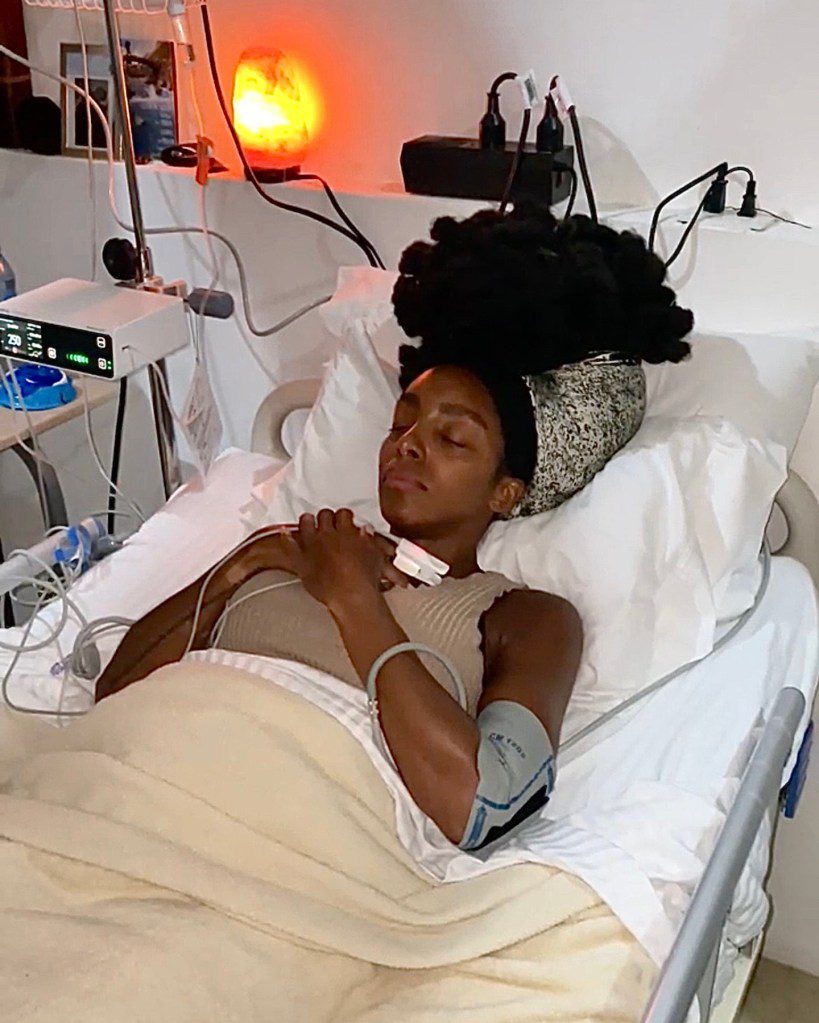
Cipriana Quann ready to undergo ibogaine treatment.
Courtesy of Cipriana Quann
DAVID ARRIVED AT BEOND ON A scorching afternoon on April 27, 2022. Over six feet tall, he waltzed into the open-plan dining room as patients and guests ate a buffet lunch of protein-heavy Mexican food. With his floppy auburn hair, David oozed charisma despite seeming furtive, somewhat ill-at-ease, and in a hurry. His entrance captivated the attention of the cadre of intensive-care nurses, who provide 24-hour assistance, and everyone else. Talking in his mile-a-minute New York accent, he told a few zany stories before going outside, by the iridescent pool, in the center of the luxury property’s garden, to smoke a cigarette.
David had been taking large amounts of fentanyl up until his arrival; his IV for the trip would need to be connected to a catheter, because he had injected drugs into so many of his veins, a former Beond employee tells Rolling Stone, and his sudden return to drug use had turbocharged his physical decline and he would keel over in bouts of pain. His drug use had been so reckless that two men were hired to escort him to Beond, Sophie says. “Speaking to him a day or two before he left, it was difficult to understand what he was saying,” she recalls.
The condition that many people are in before they take ibogaine can make it a perilous venture, especially without the correct preparation and supervision. Like David, many recipients are in poor physical health and battling severe addictions. “Looking at numbers, the mortality rate can be as high, in untrained hands, as three percent,” Kamlet told Psymposia, a psychedelic news outlet, in 2017. “I have a folder of over 60 ibogaine deaths. Every single one of those could have been avoided. Every single one.”
The Beond clinic was founded by newcomers to the ibogaine scene: Tom Feegel, an entrepreneur who told me wild tales of his previous life as a functioning addict, and his wife, Talia Eisenberg, a new-age entrepreneur who got over her opioid dependency thanks to a life-saving ibogaine trip. Feegel, the former CEO of a hand sanitizer company that did well out of the pandemic, saw both a business opportunity and a chance to help others heal. Investment was secured during a seed funding round in October 2021 and plans for rapid expansion were swiftly drawn up. Beond planned to launch several other clinics, though so far, have only ended up opening a separate resort near the clinic for patients who are not suffering from addiction.
Kamlet, a bearded, bearlike man, visited Beond upon its opening in March 2022, a month before David arrived. “Seeing a single dose of Ibogaine stop a run-away oxy habit in 12 hours still leaves me amazed,” he wrote on Instagram, posting a selfie in front of the pool. Kamlet has said he’d overseen hundreds of ibogaine sessions over 20 years and described himself as “the world’s leading expert on ibogaine administration.” He was known as the expert on cardiac safety in ibogaine treatment. Beond maintains that David received a full screening, but it’s unclear if Kamet helped screen him. Kamlet declined to comment for this story.
The two sites at Beond operate almost like a wellness retreat. About 21 patients can be cared for per week, each paying around $12,500 for a 10- to 14-day treatment protocol including one ibogaine journey, preparation, and aftercare plans, which include six hourlong remote sessions with integration therapists. New admissions arrive regularly, as others depart. Others pay extra to stay for longer to detox, relax, and recuperate. Every day there are activities such as yoga, Qi Gong, art therapy, animal therapy, and ceremonies with the ancient chocolate ingredient cacao. According to a spokesperson, the clinic today employs five certified doctors, all of whom are trained in addiction treatment.
Beond facilitated more than 600 ibogaine treatments in 2023, according to the clinic, meaning annual gross revenues could be in the region of almost $6 million. All staff, from therapists and nurses to chefs and house cleaners, have the opportunity to have psychedelic experiences themselves for free, and they did 37 times in 2023, according to a post on Beond’s Instagram. Shortly after Beond’s opening, Feegel told me that he did ibogaine himself at the clinic to deepen his understanding of the medicine. “Start today,” read their website. “Rapid painless detox & guaranteed recovery. This is Beond.”
On May 1, 2022, Sophie visited David at Beond. He was in good spirits and told her that he intended to use part of his inheritance to help people struggling with addiction. “We had a really good talk,” she says. “It was just so good to see him. I was so excited for him.”
For Beond, which trumpets its rigorous safety protocols, there was optimism within the ibogaine community that the clinic could be a success story. On many metrics, more than two years after it opened, it has been. At least three guests have had such transformative visits that they were inspired to get Beond tattoos to immortalize their experience.
Jordan Belfort, the basis of The Wolf of Wall Street, recounted his February 2023 stint in a social media post. He said he had become addicted to an opiate replacement drug in the process of quitting illegal drugs. “I thought there was no way out until someone told me about a place called Beond.” This is “the real deal,” he said, claiming he wasn’t paid for the endorsement. “They have a program based on a medicine called ibogaine which in one day resets all of your [neurotransmitter] receptor sites … And literally you end up addiction free in one day.”
Many other celebrities, fitness influencers, and TikTok personalities have attended the center for wellness and spiritual purposes for free, and later spoke highly of it. The visits marked how Beond did not want to just be an addiction clinic, but a place where visitors could open up their minds. Fitness influencer Ashley Hart appears prominently on Beond’s website, calling her journey with ibogaine “profoundly amazing.” Model Cipriana Quann, who took the medicine for psychospiritual purposes, said in an Instagram video it was “beyond incredible.” She added that the medicine brought about crystal clear clarity: “I was more aware of the things I was holding onto subconsciously. It was enlightening. It has transformed my life for the better.”
Author Kaia Roman, who wrote the acclaimed 2017 self-help book The Joy Plan, was also invited to attend Beond. Months after her week at the clinic, she says that ibogaine helped her finally find peace. But her most remarkable experience at Beond was witnessing a near metamorphosis within one of her fellow patients: “He was coming down from a hardcore heroin addiction, screaming and trying to escape.” Roman remembers Feegel, Beond’s cofounder, staying at the man’s side for several days until he was physically ready to take the ibogaine. “He was so skillful and calm,” Roman recalls of Feegel. “And then after his treatment, [the patient] was like a completely different person. He was like a puppy dog.” She says she heard that he later reconnected with his children, got a job, and stayed sober. “This is the work of angels,” Roman adds. “It was miraculous to witness his recovery.”
But some take a dim view on the use of influencers to promote psychedelic clinics and retreats. “Testimonials are supposed to help prospective clients establish whether a clinic or retreat center operates safely and ethically,” says psychedelic ethics consultant Joseph Adams. With few other mechanisms for vetting, reviews can help people avoid sketchier places, he adds. However, a psychedelic retreat recently exposed as a hellish cult generally had good reviews on the review site Retreat Guru until a flood of negative posts led the site to take down the listing. Adams says that retreat centers often record testimonials with guests just days after their psychedelic experience, but as time goes on, issues may emerge, particularly if people are unsupported. “Retreat centers need to do long-term follow-up with past clients, and if necessary remove any glowing initial testimonials from any people who later reported negative outcomes,” adds Adams.
Ultimately, influencers and celebrities are likely to receive preferential treatment by the clinics, he warns. “Their experiences are not reflective of what other clients are going to get,” says Adams. (A spokesperson for Beond disputes any suggestion that influencers receive preferential treatment: “Our changemaker participants receive exactly the same medical screening, medical treatment and monitoring … [as] any other client.”) Yet people with tens of thousands of followers on social media who have limited experience with psychedelics may not be the ideal people to critically discern whether a retreat or clinic is kosher, either. “They have a lot of sway, power, and even hypnotic charisma over their followers on social media and beyond,” Adams adds. “Their testimonials are going to be taken with a lot of weight by their devoted, perhaps even entranced followers. There’s serious ethical responsibility here.”

Mattha Busby
I ATTENDED BEOND AT THEIR INVITATION, for free, in April 2022, to undergo a weeklong treatment protocol, which I later wrote about for Vice. That’s where I met David. My all-day, all-night psychedelic voyage was delayed because one of the nurses accidentally hit a nerve in my arm when he hooked me up to the IV, which is required to ensure adequate hydration and electrolyte balance. That was part of a series of tests, repeated daily in the lead-up to the trip, which saw me undergo electrocardiograms, blood checks, pulse readings, and medical history reviews. At 9 a.m. on April 26, after a day to recover from the excruciating pain, I was in the small intensive care ward behind the kitchen, ready for my psychedelic odyssey.
The clinic head gave me and Michael, a 33-year-old American polydrug addict in the bed beside me, a dramatic speech about the power of the medicine and our fortitude at being able to receive it. I swallowed nine capsules, along with an anti-nausea tablet, and bade the doctor farewell. I put on an eye mask, a headset with a preset playlist that begins with high tempo Gabonese ritual music (it is said that the fast drumbeat helps rewire the brain), and the visions soon appeared.
A rollercoaster ride ensued, catapulting my subconscious on a high-octane slalom from a field in Gabon where the iboga plant grows and where Babongo people congregate, to the solar system and the universe. Then I saw my younger self grinning and laughing, before a gnarly vision of Christ’s crucifixion. By then, the playlist was at Pink Floyd, before going techno. The “mind purge” began, a thumping narrative of amplified negative thoughts and judgments. It went on for a couple of hours until there was blissful silence, seemingly once my egoic mind became exhausted. After 12 hours in the bed, I was unhooked. I stayed awake all night, in a blissful state of gratitude and calm, featuring an outpouring of cathartic tears that deeply connected me to my mother and father. Later, arriving back home, I was immediately stopped on the street by an acquaintance who said it seemed like a weight had been lifted from me.
What is more unlikely, however, is that the day after our session, Michael — who had been taking fentanyl, crystal meth, and benzos before coming to Beond — was able to have a proper conversation with me, with no visible withdrawal symptoms. “The light is back in my eyes,” he said in a testimonial to Beond afterward, noting he had unsuccessfully gone through many rehab programs elsewhere. “I came in completely closed off and isolated.”
David never got the chance to find out if the intense psychedelic therapy protocol would work for him. He died at Beond on Sunday, May 8, 11 days after his arrival and two days after his ibogaine trip. We had only exchanged a few words during our meeting, and I left the clinic two days later. He commented on my British accent and asked what I was in for. I told him I was there to work on myself. He said so was he. “I talked to him the day after [the treatment], and it went fine,” says Sophie. “He didn’t really have much to say about the experience itself.” He was given a “booster” dose of the medicine two days after his “flood dose.” Soon after, he was dead.
Feegel called David’s family and broke the news, Sophie recalls. “I couldn’t even believe it,” she says. Shortly after, Kamlet and Feegel rang Sophie within close proximity. “I don’t think they really had a chance to talk to each other,” she says. “Because they were both saying different things.” She says Kamlet told her he wasn’t exactly sure how David had died, but that Feegel told her David died of a heart attack and was twice brought back from the brink with a defibrillator. (A Beond spokesperson disputes Sophie’s account: “Tom spoke to [Sophie],” the spokesperson says, “but he did not discuss medical details.”) According to Sophie, Feegel then said that David asked the nurses to let him go and he deteriorated again. The medical staff attempted an unsuccessful third resuscitation, according to a former employee. “They brought him back and the last time he said, ‘Let me go,’ ” Sophie says, her distress at retelling the story clear. “That was the big thing they kept saying over and over again.”
Through a spokesperson, Beond declined to discuss the details of David’s death, citing patient confidentiality. “At Beond our medical team adheres strictly to the established protocols and professional standards,” says the spokesperson. “No client is admitted with a do-not-resuscitate order in place. No member of our clinical team, or any other physician anywhere else, would ever comply with a spontaneous DNR request. The suggestion that our doctors would do so is baseless and absurd.”
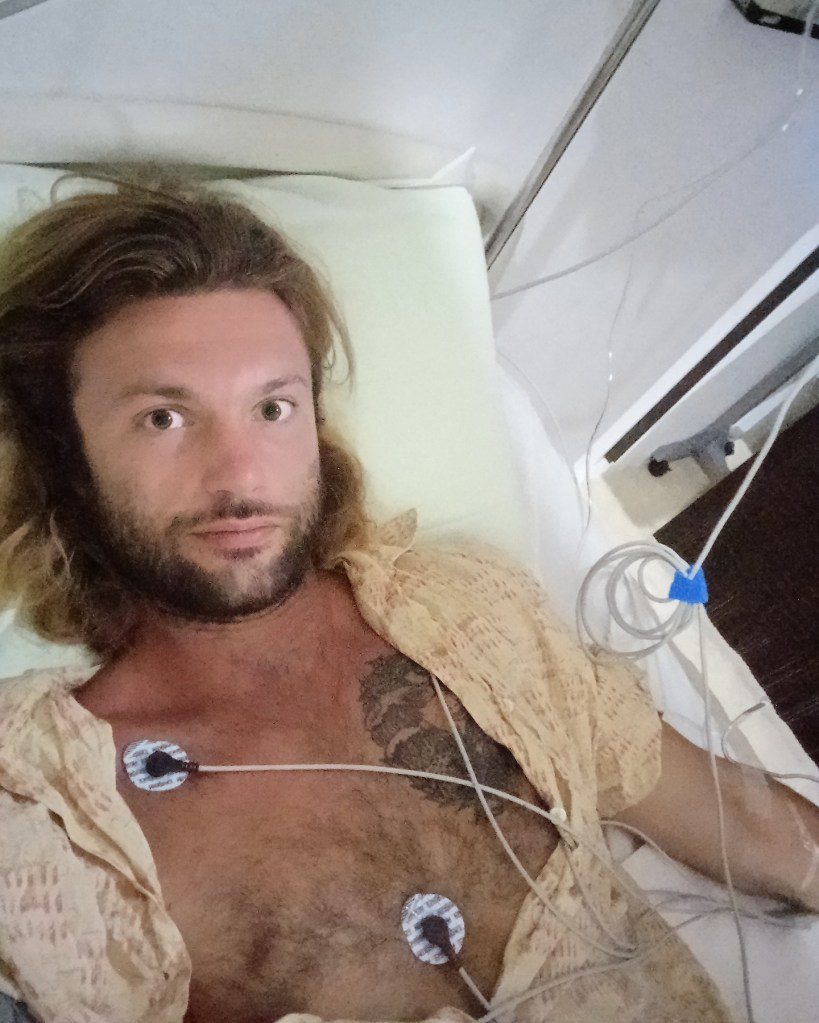
Author Mattha Busby at Beond
Mattha Busby
FEEGEL, A BESPECTACLED MAN FROM NEW JERSEY with an air of intensity, got straight on a flight to visit David’s mother in South Carolina. It is unclear exactly what was said — his mother did not respond to Rolling Stone’s request for an interview — and an autopsy was never conducted to establish a definitive cause of death. David was cremated in Cancún, and his remains were transported back within four days. His memorial service, three weeks later, was attended by some 100 people. But Feegel, despite being invited, did not go. “So many people spoke about what an impact [David] had on their lives,” says Sophie. “He was a very kind person that didn’t judge anyone and made people feel really seen and heard. Everyone loved him. He maintained friendships from childhood and boarding school in a way most people don’t, especially with a drug habit like his. He could charm the pants off anyone, male or female. He was an incredibly special soul.”
Ibogaine has changed well over 10,000 lives for the better, according to a 2021 estimate. In at least several cases, ibogaine clinics are run or owned by people formerly dependent on drugs and whose lives were revolutionized by ibogaine. “The issue is that many wish to heal others as they too were healed by this medicine, and this can be dangerous,” acknowledges one clinic owner who himself used ibogaine to kick drug dependency. Detailed studies on these topics are lacking, but a lack of training and knowledge among facilitators is the most common problem, he adds. “It is hit or miss globally.” Some are like drive-thrus without proper preparation or integration support, while others do not provide sufficient medical support. Some “relax their own rules, processes, and procedures, and this is where the proverbial can hit the fan,” says the clinic owner. This, in rare cases, can have deadly consequences. (A spokesperson for Beond maintains that all established protocols are followed and updated based on the latest medical science.)
Thirty-three ibogaine-related deaths have been reported publicly, according to the most recent authoritative study, published in the Expert Opinion on Drug Metabolism & Toxicology journal three years ago. After Nicola’s death in 1993, there was a gradual acceptance that large doses significantly raise risks. “The ibogaine-related fatalities occurred mostly in unsafe settings without proper medical monitoring and advanced cardiac life support capabilities, including ‘treatment facilities’ (15 cases), patients’ homes (6 cases), and undisclosed environments (12 cases),” the paper reported. But there are other deaths which are not reflected in these studies, like David’s, and the true figure is higher.
In November 2017, 26-year-old Canadian Milo Martinovic died two days after arriving at the Minds Alive Wellness Centre in Durban, South Africa, run by dentist Anwar Jeewa. A postmortem reportedly established that Martinovic, who was dependent on opioids, overdosed on Xanax — which he had allegedly been allowed to take unsupervised — after undergoing the treatment. Local police authorities told local media that Martinovic should “have been weaned off the benzodiazepines and opiates prior to the commencement of ibogaine treatment.” It was also alleged that there was only one nurse at the facility, who was not trained to give emergency resuscitation. Jeewa pleaded not guilty to murder in April, and the case is ongoing.
In the U.S., in March 2021, an American in Colorado was reported by officials to have died taking ibogaine, outside of a clinical setting, following a similar 2017 case in the Netherlands. Back in 2010, MAPS was seeking to design a study and was undertaking research at a clinic in Mexico, but plans were derailed after a patient died, and the proposed trial head had a bad trip. The clinic later closed down, according to three ibogaine experts. At other clinics, there are also rumors of staff members using opiates and benzos while working, and countless stories of patients in withdrawals being left to make their way home. “There are many well intentioned people involved in the space that have no business working with a medicine that has this risk of death,” says a source with insider knowledge of the ibogaine industry. “The ibogaine world has been largely fostered by former patients, but it’s time for reputable and medical professionals to further its promise.”
However, Doblin, possibly the most prominent campaigner for psychedelics policy reform, says he stands by his endorsement of Beond. “I’m comfortable referring people there,” he tells Rolling Stone. “I feel they are very committed to public safety. It’s pretty courageous to work with people who are so sick.” He also warned against “overhyping” ibogaine in promotional materials. “I would criticize anything that says this is a one-dose miracle.” (Coming off drugs can be dangerous no matter what: More than 1.4 million people with alcohol or drug dependencies were treated in inpatient, outpatient, and residential programs in 2015 in the U.S., according to federal authorities, and 3,362 died.)
Beond did not publicly address David’s death at the time, or to Rolling Stone during reporting for this article, and continued to drum up more publicity. Eisenberg, who is also the founder of the Ibogaine Research Institute, a U.S.-based nonprofit working to legitimize ibogaine, appeared on a podcast and criticized other clinics for not employing medically trained staff: “That’s why there’s been a number of deaths,” she said. Feegel later criticized other clinics. “They use ibogaine to offset or temporarily eliminate the symptoms of withdrawal, largely from opioids, and they are not in the business of healing,” he told The Guardian. A series of sponsored content articles then situated Beond as a market leader in June 2022. An in-house podcast, Ibogaine Uncovered, was launched in November 2022, and the gratis treatments for celebrities continued.
DAVID’S DEATH IS NOT THE ONLY controversy to engulf Beond. The appointment of Kamlet, the veteran doctor who was chief medical officer and is himself in recovery, last relapsing in 2008, had initially raised eyebrows. Sources describe him as “combustible,” “tough-headed,” and “condescending.” In March 2023, the 68-year-old was arrested in Miami for allegedly statutorily raping a 17-year-old girl, whom prosecutors claimed he gave cocaine before paying $600 to have sex after connecting on Tinder. According to a local news report, he was charged with “one count each of human trafficking of a minor; solicitation of a child via a cellphone to commit an unlawful sex act; unlawful sex act with a minor; and two counts each of unlawful sexual activity with a minor; delivery of a controlled substance to a minor; and custodial interference.” Kamlet attested to his innocence in court, and the charges were almost all later dropped.
Kamlet’s arrest warrant claimed he had tied the girl to his bed in April 2022, the month David was at Beond, before allegedly having sex with her without a condom, which he denied. Days later, he then allegedly offered to allow the girl and her underage friend to live with him. Kamlet reportedly texted the 17-year-old, whom he said he believed was 24, saying that they could “own the world” if she stayed off drugs. “I’m super serious,” he told her, according to texts shown in court. “Stay in touch and I’ll take care of you if we have chemistry.” Upon his arrest, bodycam footage captured him claiming to police that “nothing sexual went on.” He added, “I’m an addiction doctor here on the beach, and I have pity for these kinds of girls that get addicted and prostituted.” Kamlet reportedly told the officers that the two girls had told him “that some Black gentleman with a gun was trying to prostitute them, and they asked [Kamlet] if they could stay here for a night to get away from him.”
But before Kamlet’s trial, the 17-year-old was found dead in a river, with no cause of death yet disclosed. The prosecution dropped 12 of the 13 charges, and in March, Kamlet pleaded guilty to a single third-degree felony — custodial interference — and he surrendered his medical license as part of a plea deal.
As the news broke on local TV of Kamlet in an orange jumpsuit in court, Eisenberg sent a memo to staff, which has been seen by Rolling Stone, acknowledging that “very troubling news” had come to light. “Beond terminated our consulting relationship with Dr. Kamlet last year and stopped all work with him at that time.” She said the separation was necessary due to Kamlet’s “demonstrated incompatibility with our professional culture, our core values, and our business processes.” Eisenberg added that Kamlet “deserves to be held accountable, and deserves the right to heal and wish the best for him in the future, as he, hopefully, gets the counseling and support he needs … We can’t help people if we ourselves are sick and suffering in secret.”
Whether Beond’s well wishes for Kamlet have aged well remains to be seen. But David’s death is a cautionary tale for the nascent ibogaine industry. Treatment with the powerful psychedelic has great promise in easing the spiraling human losses from the opioid crisis, but treatment can be fraught with danger. Many unanswered questions remain over how ibogaine operates in the body, and Sophie still does not have closure on the cause of her ex-husband’s death. “It’s so heartbreaking because [David] died trying to get well.”
This story was produced in partnership with DoubleBlind, an independent magazine covering the psychedelic industry.
Correction: A previous version of this story stated that Talia Eisenberg is a psychotherapist. She is an entrepreneur.


